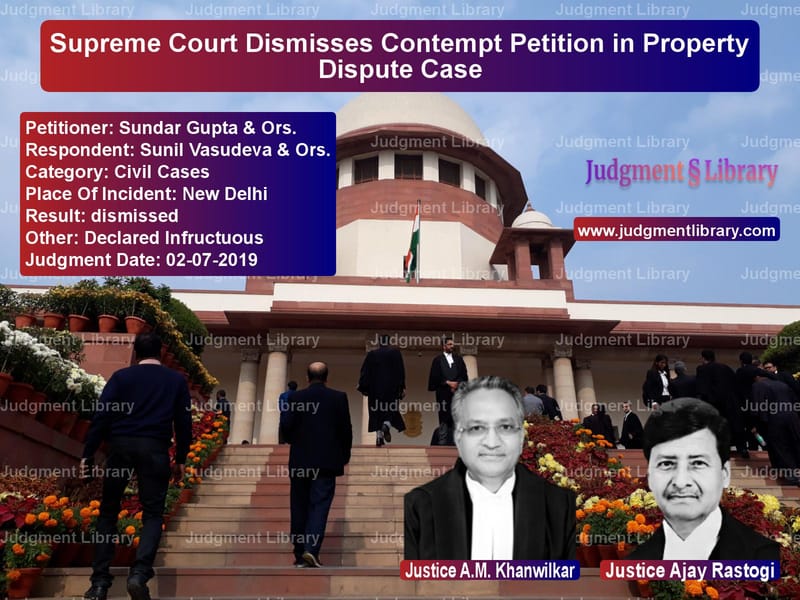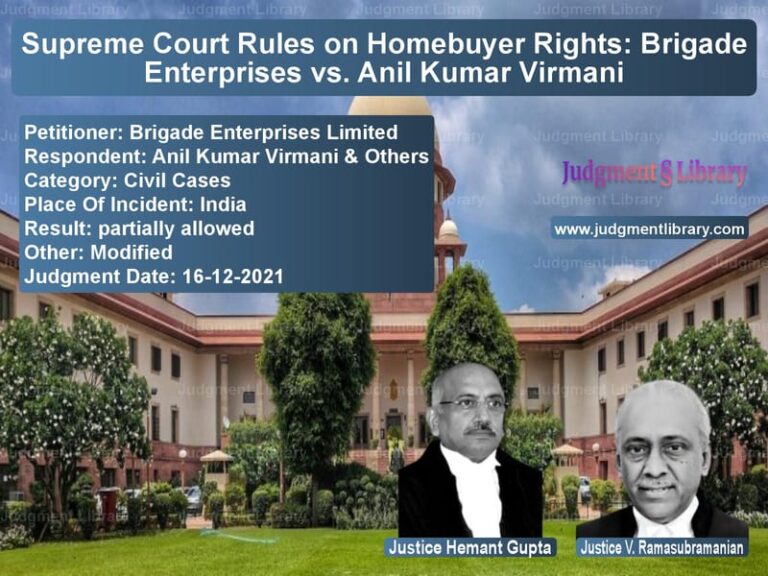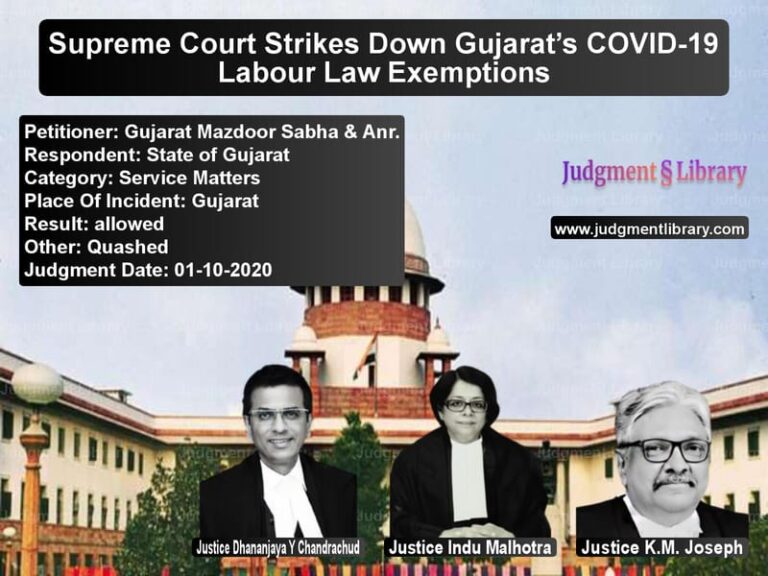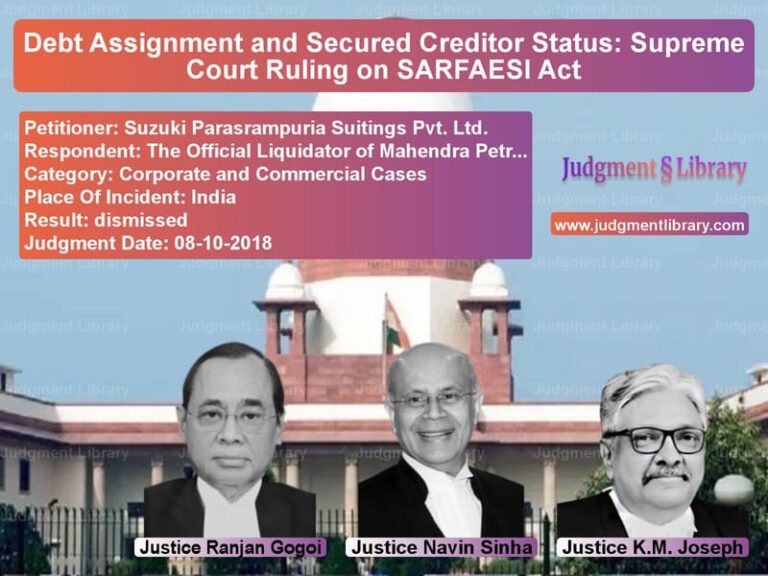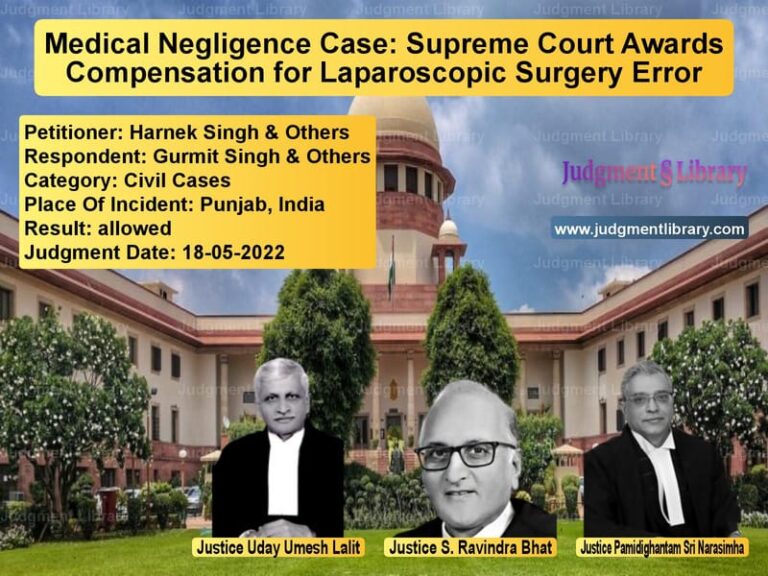Supreme Court Dismisses Contempt Petition in Property Dispute Case
The case of Sundar Gupta & Ors. vs. Sunil Vasudeva & Ors. revolves around a contempt petition filed in relation to a property dispute. The Supreme Court dismissed the contempt petition, stating that the main civil appeal had already been decided, rendering the contempt proceedings infructuous.
The case initially arose from a long-standing property dispute between the parties. The petitioners had approached the Supreme Court alleging non-compliance with an earlier court order. However, with the disposal of the main appeal in Civil Appeal No. 5140 of 2019 (arising out of SLP(C) No. 5449 of 2015), the contempt petition became irrelevant.
Background of the Case
The key events leading to the case are as follows:
- The dispute involved claims over a property, with both parties asserting ownership rights.
- The matter was initially decided by lower courts, leading to appeals being filed.
- The Supreme Court, in Civil Appeal No. 5140 of 2019, passed a final ruling on the ownership and rights concerning the property.
- Despite the ruling, the petitioners alleged that the respondents failed to comply with the Supreme Court’s judgment.
- A contempt petition was filed in 2017 to seek enforcement of the judgment and penal action against the respondents.
Petitioner’s Arguments
The petitioners, represented by legal counsel, raised the following arguments:
- The respondents had deliberately violated the Supreme Court’s order in the main appeal.
- The non-compliance of the respondents amounted to contempt of court.
- The Supreme Court should take strict action to ensure compliance with judicial orders.
- The contempt petition should not be dismissed solely because the main appeal had been decided.
Respondent’s Arguments
The respondents countered with the following points:
- The contempt petition had become infructuous as the main appeal had already been decided.
- There was no willful disobedience of the Supreme Court’s ruling.
- The alleged non-compliance was due to procedural and administrative issues rather than deliberate defiance.
- The petitioners were attempting to use contempt proceedings as a means to reopen the dispute.
Supreme Court’s Observations
The Supreme Court bench, comprising A.M. Khanwilkar and Ajay Rastogi, made the following key observations:
- The main civil appeal had already been decided, resolving the dispute between the parties.
- The contempt petition was filed on the basis of alleged non-compliance with an earlier order.
- Since the Supreme Court had already ruled on the substantive matter, the contempt petition was no longer relevant.
- There was no need for further proceedings as the primary legal issue had been conclusively determined.
Critical Judgment Excerpt: “In view of the order passed by us in Civil Appeal arising out of SLP(C) No. 5449 of 2015 dated 2nd July, 2019, the contempt petition has become infructuous and is accordingly dismissed.”
Final Decision
The Supreme Court dismissed the contempt petition, ruling that:
- The issue at hand had already been resolved in the main civil appeal.
- The contempt proceedings no longer served any legal purpose.
- All pending applications related to the case were also disposed of.
Implications of the Judgment
This ruling has significant implications for contempt proceedings and enforcement of judicial orders:
- Clarifies that contempt petitions cannot be used to relitigate settled disputes.
- Reaffirms that judicial decisions must be enforced through proper legal channels rather than contempt proceedings.
- Prevents misuse of contempt jurisdiction to extend litigation beyond necessary limits.
- Ensures that contempt actions are only pursued in cases of clear and willful disobedience.
Legal Precedents and Framework
The Supreme Court’s ruling aligns with established legal principles governing contempt of court. Key precedents include:
- Delhi Development Authority vs. Skipper Construction (1996) – Established that contempt proceedings must be limited to clear cases of disobedience.
- State of Maharashtra vs. Mahboob S. Allibhoy (1996) – Clarified that contempt jurisdiction cannot be used as a substitute for enforcing civil orders.
- Kapildeo Prasad Sah vs. State of Bihar (1999) – Held that contempt must be used sparingly to uphold the dignity of the court.
Conclusion
The Supreme Court’s decision in Sundar Gupta vs. Sunil Vasudeva ensures that contempt petitions are not misused to reopen resolved legal disputes. By dismissing the petition, the Court upheld the principle that contempt proceedings must be pursued only in cases of clear, deliberate, and willful disobedience. This ruling reinforces judicial efficiency and prevents unnecessary prolongation of litigation.
Petitioner Name: Sundar Gupta & Ors..Respondent Name: Sunil Vasudeva & Ors..Judgment By: Justice A.M. Khanwilkar, Justice Ajay Rastogi.Place Of Incident: New Delhi.Judgment Date: 02-07-2019.
Don’t miss out on the full details! Download the complete judgment in PDF format below and gain valuable insights instantly!
Download Judgment: Sundar Gupta & Ors. vs Sunil Vasudeva & Ors Supreme Court of India Judgment Dated 02-07-2019.pdf
Direct Downlaod Judgment: Direct downlaod this Judgment
See all petitions in Contempt Of Court cases
See all petitions in Judgment by A M Khanwilkar
See all petitions in Judgment by Ajay Rastogi
See all petitions in dismissed
See all petitions in Declared Infructuous
See all petitions in supreme court of India judgments July 2019
See all petitions in 2019 judgments
See all posts in Civil Cases Category
See all allowed petitions in Civil Cases Category
See all Dismissed petitions in Civil Cases Category
See all partially allowed petitions in Civil Cases Category

